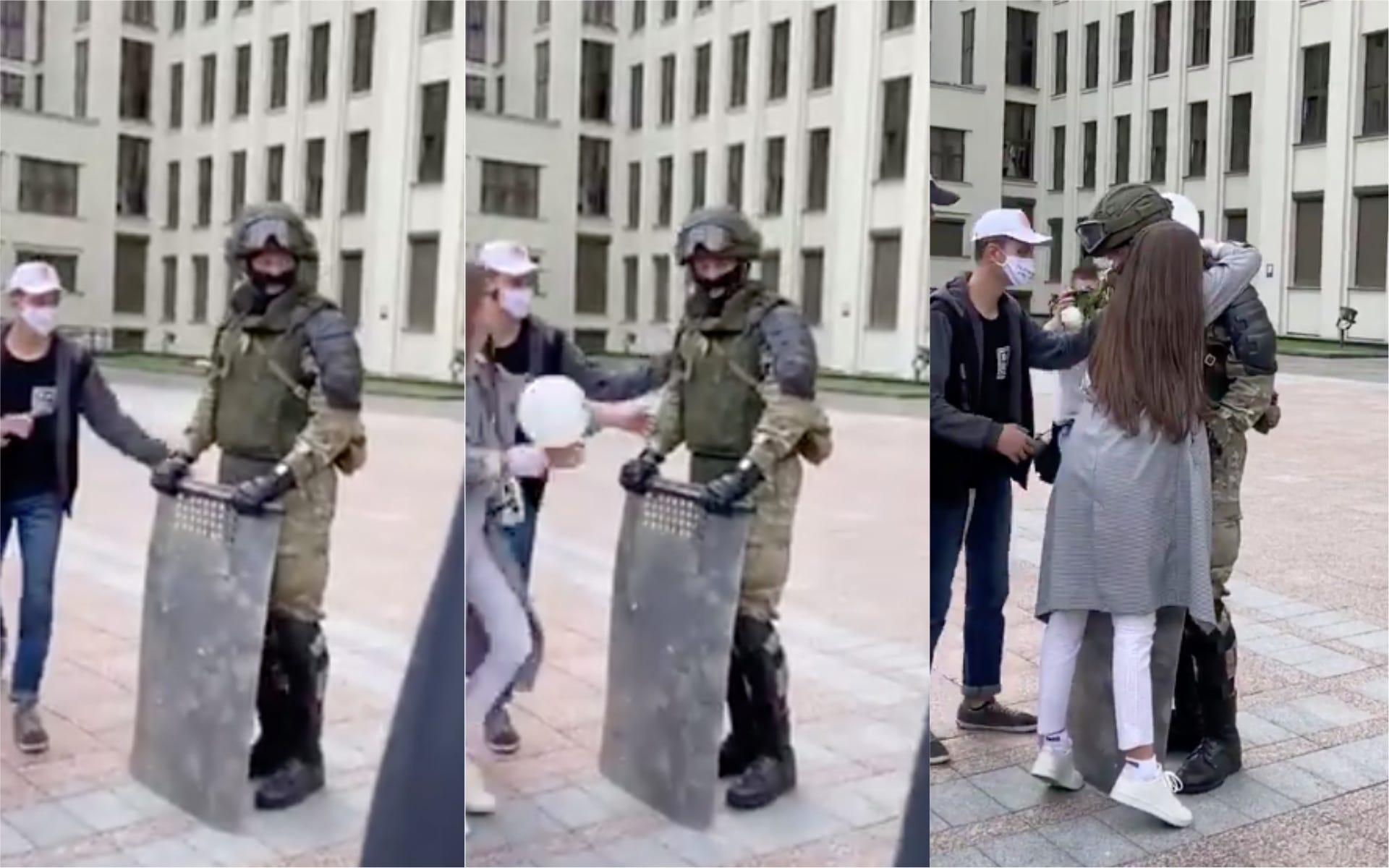- Footage published by CNN on Friday shows riot police officers in Belarus lowering their shields in a sign of solidarity with the country’s protesters and being embraced by them.
- It comes after a week of unprecedented protests against President Alexander Lukashenko and his claim to have won the country’s presidential election. Critics say the vote was rigged.
- At least 6,000 protesters have been detained, with many reporting being victims of police torture. The Belarusian interior ministry has since promised to release all the imprisoned demonstrators.
- Lukashenko, meanwhile, is clinging to power. On Saturday he published a statement calling the protests a “scenario of aggression against Belarus.”
- He also released 32 Russian mercenaries that President Vladimir Putin has been trying to get back, in what could be a ploy to get Putin’s support against the protesters.
- Visit Business Insider’s homepage for more stories.
At least 50 riot police officers in Belarus have lowered their shields in a sign of solidarity with the protesters protesting last week’s election result, CNN reported.
CNN’s Mary Ilyushina on Friday tweeted a video of an officer holding their shield on the ground in front of the Central Elections Committee Building in Minsk. The protesters respond by hugging them.
Photos from the same location show protesters hugging riot police officers.
Scenes at the Central Elections Committee pic.twitter.com/IHgFt5D4Xy
— Mary Ilyushina (@maryilyushina) August 14, 2020
Looks like tens of thousands at the Central Elections Committee Building. Protesters chanting “Brothers!” to riot police, trying to avoid confrontation. pic.twitter.com/2fXFzuNBso
— Mary Ilyushina (@maryilyushina) August 14, 2020
The scenes come after a week of protests against President Alexander Lukashenko, who last Sunday claimed victory in the latest presidential election. His office said he had won over 80% of the vote, though critics believe it was rigged.
Lukashenko has been in power in Belarus since 1994 and is widely described as "Europe's last dictator."
Several military and police officers have pledged not to attack protesters in an apparent rejection of Lukashenko in recent days, according to CNN.
Belarusian TV station Nexta aired a video of a police officer saying he would not follow "criminal orders." He also urged colleagues not to point their guns at peaceful protesters.
Footage from this week's demonstrations showed protesters and police clashing, sometimes violently. At least 6,000 people have been arrested and detained, with many saying they were beaten and tortured upon arrest.

The Belarusian interior minister issued a rare apology for the attacks on the protesters on Friday, saying that all demonstrators detained would be freed. Hundreds have been released so far.
On Wednesday, the country's state TV broadcast footage of six apparently bruised protesters promising to give up.
Putin helps out
As protests raged on, Lukashenko on Saturday published a statement calling the demonstrations a "scenario of aggression against Belarus," and suggested that there were "elements of external interference," according to BBC Monitoring.
The Kremlin also published a statement - albeit vague - saying that Russian President Vladimir Putin and Lukashenko had spoken on the phone and "expressed confidence that emerging problems will be settled."
Kremlin says Lukashenko and Putin have spoken by phone:
"Both sides expressed confidence that emerging problems will be settled. The most important thing is that destructive forces willing to harm the mutually beneficial cooperation… do not take advantage of the situation” pic.twitter.com/E6IjGSK8fE— BBC Monitoring (@BBCMonitoring) August 15, 2020
Putin has long wanted Belarus to stay closely aligned to Russia, though his relationship with Lukashenko was complicated earlier this month when Belarus arrested 33 Russian mercenaries.
Russia, on Friday, announced that Belarus had returned 32 of those detained Russian citizens.
The release may have been part of Lukashenko's ploy to encourage Russian support against the protesters. As one NATO official told Insider's Mitch Prothero earlier this week, before the Russians were released: "My guess is that Lukashenko will extract some support from Putin and eventually return the mercenaries."

